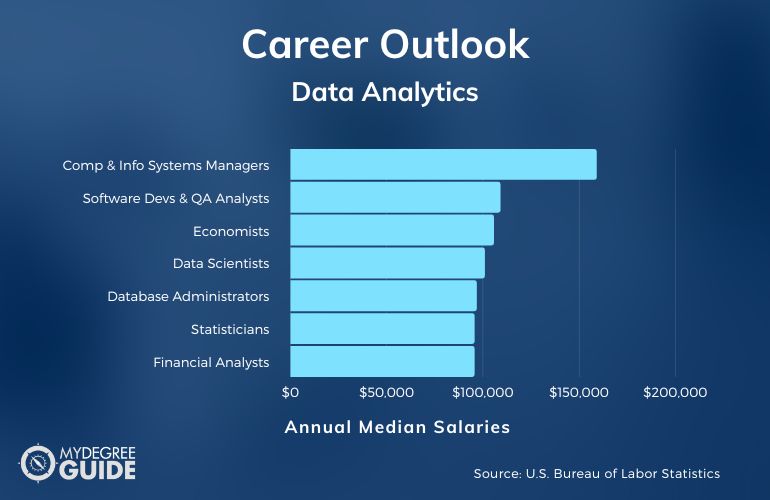A masters in data analytics can teach you how to gather and analyze data to provide clients or businesses with solutions.

Raw data is analyzed to provide companies or clients with insight into their operations and help navigate future patterns. An online data analytics graduate program can be a flexible way to earn your advanced degree.
Editorial Listing ShortCode:
If you’re interested in gathering hard data to make sense of complex issues, earning a master’s in data analytics might be a strategic path for you to further your professional qualifications.
Universities Offering Online Masters in Data Analytics Degree Programs
Methodology: The following school list is in alphabetical order. To be included, a college or university must be regionally accredited and offer degree programs online or in a hybrid format.
Arizona State University
Arizona State University offers an online program for a Master of Science in Program Evaluation and Data Analytics. The program requires the completion of 11 classes for a total of 33 credit hours. Each class is 7.5 weeks long. The curriculum explores how to improve organizational performance in public and nonprofit sectors.
Arizona State University is accredited by the Higher Learning Commission.
Boston University
Boston University offers an online program for a Master of Science in Applied Data Analytics. It requires the completion of 32 credits and can usually be finished in 16 to 24 months. The curriculum provides opportunities to build a portfolio through the completion of hands-on class projects. Boston University aims to provide a supportive online community.
Boston University is accredited by the New England Commission of Higher Education.
Louisiana State University
Louisiana State University offers an online program for a Master of Science in Analytics. The program requires the completion of 36 credit hours. Potential courses include Descriptive Analytics, Advanced Statistical Analysis, and Cybersecurity for Business. LSU’s online programs are designed to help students balance their school with other commitments.
Louisiana State University is accredited by the Southern Association of Colleges and Schools Commission on Colleges.
Maryville University
Maryville University offers a Master of Science in Data Analytics that can be earned online. GRE and GMAT scores are not needed to apply. The program offers 6 start dates a year. The curriculum is designed to teach hands-on skills that can be applied at real jobs. Potential courses include Data Analytics I and II, Database Principles, and Data Mining.
Maryville University is accredited by the Higher Learning Commission.
Northern Illinois University
Northern Illinois University offers an MS in Data Analytics. This 30 credit program is available entirely online and can potentially be completed in just 1 year. Courses are 10 weeks long and taught by faculty with research experience. The program also provides the opportunity to earn the NIU-SAS joint certification credential.
NIU is accredited by the Higher Learning Commission.
Oregon State University
Oregon State University offers an online program for an MS in Data Analytics. The program uses a quarterly academic calendar, with new students starting in the fall. OSU provides a diverse learning community, with students residing in all fifty states and in many countries outside of the US.
Oregon State University is accredited by the Northwest Commission on Colleges and Universities.
Pennsylvania State University
Pennsylvania State University’s Master of Professional Studies in Data Analytics can be earned in an online, asynchronous program that is designed to be convenient for working adults. It requires the completion of 30 credits. Potential courses include Foundations of Predictive Analytics, Large-Scale Database and Warehouse, Data-Driven Decision Making, and Database Design Concepts.
Pennsylvania State University is accredited by the Middle States Commission on Higher Education.
Southern New Hampshire University
Southern New Hampshire University offers an online program for an MS in Data Analytics that can potentially be completed in just 15 months. The program is open to those currently working in the field and those looking to change careers. There are no set class meeting times, so students can work according to their own schedules.
Southern New Hampshire University is accredited by the New England Commission of Higher Education.
University of Maryland Global Campus
The University of Maryland Global Campus offers an online program for a Master of Science in Data Analytics. It requires the completion of 36 credits. Potential courses include Decision Management Systems, Data Management and Visualization, and Big Data Analytics. The program culminates with a capstone course that requires the completion of a major project.
The University of Maryland Global Campus is accredited by the Middle States Commission on Higher Education.
Western Governors University
Western Governors University offers an MS in Data Analytics that can be earned online. Potential courses include Exploratory Data Analysis, Representation and Reporting, and Data Acquisition. The program can typically be finished in less than 2 years. Students who already have Oracle SQL Expert certification may be able to waive certain course requirements.
Western Governors University is accredited by the Northwest Commission on Colleges and Universities.
Masters in Data Analytics Programs Online

A data analytics master’s degree is designed for prospective graduate students who want to learn how to analyze and manage data to provide solutions for complex issues.
You can develop knowledge of data mining techniques and data storage and visualization tools. You may have the opportunity to use Tableau and Structured Query Language (SQL), which are commonly used in the field.
The curriculum in a data analytics master’s program covers a wide range of topics, such as:
- Predictive analytics
- Data management
- Data visualization and presentation
- Data modeling
These subject areas cover key skills that data analytics professionals need to collect, interpret, and present complex data. You can also learn how to predict data patterns, which can be useful for businesses or clients to make evidence-based decisions.
Effective communication, collaboration, and attentiveness are some soft skills that can come in handy for data analytics careers and similar occupations. Since data analytics can be applied to almost any industry, there is a wide range of career options where these skills can be applied.
Examples of some industries professionals may enter with a data analytics graduate degree include:
- Manufacturing
- Finance
- Business
- Healthcare
- Computer and information technology
The direction you take with a master’s in data analytics may depend on your interests and degree type. Many data analytics programs give students the option to specialize in a specific industry.
Data Analytics Careers and Salaries

Data analytics can be found in virtually every industry because it helps businesses and organizations improve their operations by becoming more efficient and profitable.
Gaining data analytics skills can provide you with a wide range of possibilities. Professionals may use their master’s degree in data analytics to enter a variety of industries, such as marketing, finance and insurance, business management, or computer and information technology.
According to the Bureau of Labor Statistics, these are the annual median salaries of data science and analytics careers.
| Careers | Annual Median Salaries |
| Computer and Information Systems Managers | $159,010 |
| Software Developers, Quality Assurance Analysts, and Testers | $109,020 |
| Economists | $105,630 |
| Data Scientists | $100,910 |
| Database Administrators | $96,710 |
| Statisticians | $95,570 |
| Financial Analysts | $95,570 |
| Management Analysts | $93,000 |
| Operations Research Analysts | $82,360 |
| Market Research Analysts | $63,920 |
If you’re interested in analyzing data to predict trends, you might take interest in a career as a market research analyst, economist, or data scientist.
If you want to apply your master’s in data analytics to the business world, you might consider positions like management analyst or operations research analyst. Job availability and salaries can vary depending on the level of education, work experience, industry, and geographic location.
MS in Data Analysis Curriculum & Courses

The data analytics curriculum includes in-depth coursework that teaches you how to gather, analyze, interpret, and present data to make informed decisions and provide solutions.
Major coursework that may be offered in a masters in data analytics online program includes:
- Foundations of Data: You’re introduced to how big data impacts various business processes, and you’ll learn about analytic techniques and tools to analyze data.
- Project Management: This course teaches you about the aspects of managing projects, including planning, supervision, and collaboration.
- Presentation and Visualization of Data: You’ll learn how to interpret and present gathered data using visualization tools.
- Optimization and Risk Assessment: This course studies risk assessment and management strategies and the impact data has on business operations.
- Predictive Analytics: You’ll learn how to forecast data trends and patterns using various data mining and machine learning techniques.
- Enterprise Data Management: Analyzing and maintaining data in relation to the world of business is explored in this course.
- Decision Methods and Modeling: This course teaches you how to make informed decisions based on the interpretation of data trends and predictive modeling.
- Data Mining: Techniques and tools used for extracting or mining data are examined in this course.
- Statistical Foundations for Data Analytics: You’re introduced to statistical foundations for data mining, which includes the study of statistical inference, hypothesis testing, and analysis of variance.
- Big Data Analytics: This course teaches you about big data, including how to manage and analyze large amounts of data and understand big data storage.
Core coursework provides you with a foundational understanding of analyzing and interpreting data using various data mining, visualization, and modeling tools. You may choose elective coursework that helps you develop skills in preparation for a particular industry.
How to Choose an Online Masters Degree in Data Analytics Program

Data analytics master’s programs can differ between institutions, and there are several factors you can think about to help you weigh out your options.
When looking at different data analytics graduate programs, you might consider the following:
- Length of the program. Master’s programs can vary in length. Some schools have a 30-credit-hour minimum requirement, while others require more credits to graduate.
- Cost of tuition. If the cost of tuition is an important factor for you, you may compare the tuition costs between online versus in-person programs, private versus public institutions, and in-state versus out-of-state colleges.
- Accreditation status of the institution or program. Accreditation is the mark of a credible, high-quality education. The accreditation status of your school may impact financial aid and even employment opportunities.
- Available resources. Some schools offer more resources than others, such as career guidance and internship opportunities.
- Available concentrations or specialized fields. Data analytics can be applied to a broad range of industries. If you’re interested in a specific industry, such as healthcare or cybersecurity, you may consider finding an online master’s in data analytics that specializes in a specific sector.
Choosing the right data analytics master program for you may help you succeed in gaining more resources and opportunities throughout the program and upon completion.
Master in Data Analytics Admissions Requirements

You can find specific admissions requirements by reviewing a college’s website or by contacting the admissions office. Admissions requirements can vary between schools and programs, but general master’s degree admissions requirements include:
- Official undergraduate transcripts
- GRE or GMAT scores (only some schools require them)
- Resume or CV
- Letters of recommendation
Colleges review your completed coursework, work experience, and GPA using your official transcripts and resume or curriculum vitae. Some schools have a minimum GPA requirement. The GRE and GMAT are standardized tests that determine your skills and strengths in various subject areas. Some colleges don’t ask for these test scores.
Masters Programs in Data Analytics Accreditation

Colleges and universities can choose to go through a rigorous screening process to become regionally accredited. The accreditation status of a school verifies its credibility in offering quality education with proper resources and facilities as well as qualified faculty.
Accreditation can be important for financial aid eligibility, employment opportunities, and future education. Some graduate admissions offices require students to have an undergraduate degree from an accredited institution or program. Employers often consider the accreditation status of an institution or program when reviewing job candidates.
You can research different accredited postsecondary institutions on the US Department of Education’s website.
Data Analytics Licensure and Certifications

Although licensure or certification is not required for all data analytics jobs, it could help expand your job opportunities and prove you have the qualifications to complete specific responsibilities.
Some common data analytics certifications include:
- Certified Analytics Professional (CAP)
- Tableau Desktop Specialist
- CCA Data Analyst
Data analytics professionals may pursue certification in a specific area to show they have the ability to use certain tools or techniques for data analysis. Requirements can vary depending on the type of certification, but you’re commonly required to hold a bachelors or masters, have professional experience, and pass a certification exam.
Financial Aid and Scholarships

If you’re wanting to receive financial assistance, you can apply for financial aid and scholarship opportunities. Federal and state financial aid is based on your household income and other factors, such as your enrollment status and the cost of tuition at your school. You can submit a Free Application for Federal Student Aid (FAFSA) to find out if you’re eligible for federal assistance.
Scholarships are another form of aid that can be based on income, special interests, or academic achievements, among other things. Colleges and various organizations, such as nonprofits or businesses, may offer scholarships. The amount of money awarded through a scholarship can vary widely.
What Is a Data Analytics Master Degree?

A data analytics master degree is a technical graduate program that explores data mining, visualization, analysis, and management.
The program can help prepare students for various data analytics careers, such as data analyst, market research analyst, or financial analyst. Things to expect from the program include learning how to evaluate and compile big data for risk assessment and problem-solving as well as how to present data through reports and visuals to stakeholders.
You can develop both soft and hard skills, such as decision-making, written and oral communication, and data interpretation.
What Can I Do with a Masters in Data Analytics?

A master’s in data analytics can help prepare you for a career in data analytics or data science. It can also be used as a pathway to leadership positions or to doctoral studies, such as an on-campus or online PhD in Data Analytics.
The curriculum of a data analytics graduate program is designed to help students develop the skills they need to provide solutions based on raw data analysis and interpretation. Some of the largest employers for data analytics professionals include professional, scientific, and technical services.
Data analytics positions can be spread across multiple industries, such as healthcare, business, finance, and education. Common roles include operations research analysts, data analysts, statisticians, and data scientists.
How Long Does It Take to Get an Online Data Analytics Masters Degree?

The length of a master’s in data analytics program can vary depending on the credit hours required, your enrollment status, and other factors.
If it’s a 36 credit hour program with no thesis required, the program may be completed in 1 year with full-time, year-round enrollment. Part-time enrollment will likely add additional time. If a thesis is required, it can take longer to complete. Conducting research and writing a master’s thesis tends to add on to at least two months or more.
What’s the Difference Between Data Science vs. Data Analytics MS Online?
Data science and data analytics master’s programs may cover some of the same material, but here are some of the different learning outcomes.
| Online MS in Data Science | Online MS in Data Analytics |
|
|
Data science involves designing and building new models and algorithms to solve complex issues, while data analysis curriculum focuses on learning how to analyze current data to provide solutions. In addition to masters degrees in data analytics, a growing number of universities also offer data science masters degree online and on-campus programs.
What’s the Difference Between an MBA vs. MS in Data Analytics Online?
A Master of Business Administration and a Master of Science in Data Analytics are two types of graduate programs with slight differences.
| MBA in Data Analytics | MS in Data Analytics |
|
|
An MBA in Data Analytics includes coursework on business decision-making using data analytics. An MS is less restrictive because the curriculum doesn’t narrow the scope to one specific industry.
Is an Online Masters in Data Analytics Worth It?

Yes, an online masters in data analytics is worth it for many students. The expected continuous need for professionals to analyze and interpret data for businesses makes this a growing field.
In fact, the Bureau of Labor Statistics projects faster-than-average job growth for several data analytics occupations over the next ten years. For instance, 23% job growth is projected for operations research analysts, and 33% job growth is expected for statisticians.
As more businesses use online resources to conduct business operations, data collection, and management needs will increase. A masters degree in data analytics can also help you work toward senior or leadership positions in the field.
Getting Your Master’s Degree in Data Analytics Online

A masters degree in data analytics teaches you how to collect, interpret, and manage data using various data analytics tools and techniques. You may explore visualization tools, predictive modeling, and risk assessment strategies to provide solutions supported by data.
If you’re interested in data mining, monitoring current data trends, and collaborating with a team to solve problems, you might consider earning a data analytics master program online. An online data analytics degree may help you advance or even qualify for leadership roles.
You can begin researching masters in data analytics online programs from accredited schools to find the program that best supports your goals.
